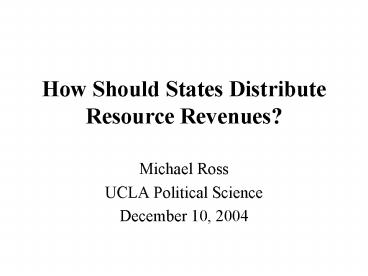How Should States Distribute Resource Revenues - PowerPoint PPT Presentation
1 / 16
Title:
How Should States Distribute Resource Revenues
Description:
How Should States Distribute Resource Revenues? Michael Ross. UCLA Political Science ... Freedom from political interference, Distributional fairness, ... – PowerPoint PPT presentation
Number of Views:19
Avg rating:3.0/5.0
Title: How Should States Distribute Resource Revenues
1
How Should States Distribute Resource Revenues?
- Michael Ross
- UCLA Political Science
- December 10, 2004
2
Overview
- Which revenue system works best?
- Specialized Funds
- Federal Arrangements
- Direct Distribution
- General Revenues
- How can any of these be protected - from
corruption, patronage, and misuse?
3
My Main Arguments
- There is no evidence that any of these
institutions helps developing states manage their
resource revenues - Dont promote any single type of revenue
distribution system - Instead, establish international rating system of
oil states, and reward good performers and
penalize laggards.
4
Specialized Funds features
- Goal is savings, stabilization, or both?
- How are funds accrued?
- Can the fund itself make expenditures?
- How is the fund governed?
5
Specialized funds record
- Many studies of failures (Gelb 1988, Schiff and
Valdes 1992, Karl 1997, Collier and Gunning
1999) - Davis et al. (2003) no evidence that funds
improve fiscal policies. - Even in Norway and Chile, no evidence that the
creation of funds influenced fiscal performance. - Governments readily gain access to assets that
are nominally independent.
6
Some perverse effects
- Can make revenues less transparent and more
susceptible to patronage/corruption - Intertemporal transfer of assets from prudent to
imprudent governments?
7
Federal Tax/Revenue Sharing
- Do subnational governments simply receive
transfers, or do they actually administer
taxes/royalties? - How much fiscal autonomy do subnational
governments have?
8
Advantages of centralized revenue management
- Central governments are better equipped to handle
volatility, uncertainty - Can use revenues countercyclically
- Can better administer complex taxes
- Can make equity-enhancing transfers across
regions
9
How do federal arrangements perform?
- No systematic evidence
10
Direct Distribution
- Works well in Alaska, Alberta
- Advocates claim
- Keeps part of oil revenues out of hands of
politicians - Second-best method for handling volatility
- Gives citizens a greater incentive to monitor
government performance.
11
Direct Distribution worries
- In developing states where rule of law is weak
why would these be more stable and less corrupt
than specialized funds? - Complex to administer and guard vs. fraud
- Some will see as unfair
- Could promote decentralized rent-seeking
organizations protection rackets, etc.
12
How can any of these institutions be protected?
- Very hard for governments to bind the hands of
their successors - Intertemporal savings plans are especially
fragile Example of US government. - Best performing oil states 1970-2000 monarchies
and stable dictatorships, which rely on stable
leadership, not institutions.
13
Oil/Mineral Dependence and Changes in
Child Mortality, 1970-2000
14
First suggestion
- We should not promote a one-size-fits-all
institutional fix for oil-exporters - There is too much variation among oil states
- There is too little evidence that any of these
institutions has a positive effect - Some reforms can have perverse effects.
15
Second suggestion
- Set out basic guidelines on
- Transparency, independent audits,
- Freedom from political interference,
- Distributional fairness,
- Converting oil revenues into public goods.
- Rate the annual performance of oil states, based
on these criteria - Reward good performers and penalize laggards
- Tie rankings to loan guarantees from ECAs
- Encourage oil firms to pressure laggards.
16
Summary
- There is little reason to think that
institutional reform will lead to better revenue
management - A system of performance-based rankings is worth
considering.































